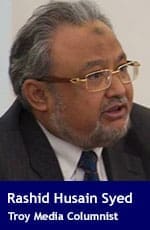Massive oil and gas discoveries are shattering peak oil predictions and transforming the global energy landscape

For interview requests, click here
Oil pundits have long been divided on the issue of peak oil. Some, like the late Matthew Simmons, founder and chairman emeritus of Simmons & Company International, have been insisting for ages that oil is a finite product and that the world would run out of it sooner rather than later. On the other hand, others, myself included, have been convinced for decades that there is no lack of resources beneath the surface.
The real problems aren’t below the surface – they’re above it. Political tensions and on-the-ground challenges are making it tough to get this asset out of the ground and into use.
Over the last couple of decades, new oil frontiers have emerged on the global energy map. Many insist that Iraq’s crude potential has not been exploited to capacity, while UAE’s crude asset base has also expanded significantly over the last several years.
The rise of the shale industry in the United States has shifted the geopolitical landscape in significant ways. Today, the U.S., not Saudi Arabia or Russia, is the world’s largest oil producer. OPEC is no longer the only key player on the global energy stage, as the U.S. now plays a dominant role in shaping energy dynamics
 |
| Recommended |
| Peak Oil is dead: Technology shatters the era of scarcity
|
| Crude oil prices tumble, offering relief to consumers
|
| Net-zero policies set to cripple Alberta’s economy
|
Meanwhile, Africa has emerged as the new ‘crude’ frontier of the world. Angola, a comparatively new find, is now showcasing its comparatively large asset base.
All this is a sigh of relief to the still “crude” dependent civilization of ours.
And, if media reports are to be believed, Pakistan, where another massive oil and natural gas discovery has recently been reported, is the new kid on the global energy map.
If confirmed, this will further prove that there is no shortage of valuable resources beneath the earth’s surface.
A lengthy exploration effort has resulted in the discovery of significant oil and gas reserves in Pakistan’s territorial waters, according to a report from Pakistan’s leading English daily, DAWN, which cited a senior security official. The discovery was confirmed after a three-year survey conducted in collaboration with an allied nation.
According to some estimates, the find could be the “fourth largest” oil and gas reserves in the world.
According to available data, Venezuela currently holds the largest oil reserves, with over 300 billion barrels, followed by Saudi Arabia, Iran, Canada, and Iraq. The United States is believed to have the largest reserves of untapped shale oil. Additionally, several other countries, including Pakistan, also have a considerable amount of untapped shale oil and gas resources, according to the U.S. Energy Information Agency (EIA).
A recent geographic survey of Pakistan’s offshore territory has identified the exact location of the oil and gas deposits. A senior official referred to this as a chance to benefit from the “blue water economy,” which refers to the sustainable use of ocean resources for economic growth, noting that proposals for bidding and exploration are currently being reviewed, which could pave the way for exploration activities to begin in the near future.
Analysts, quoted in media, are of the view, that it would take years before Pakistan would be able to exploit the newfound assets, adding that exploration alone required a hefty investment of around $5 billion and it might take four to five years to extract reserves from an offshore location.
Despite the news, oil majors do not seem to be rushing over to obtain a slice of the pie, according to Alex Kimani in Oilrpice.com. In recent years, companies like Total, Shell, and Eni have pulled out of Pakistan for various reasons. A key issue appears to be security. In July, Pakistan’s Petroleum Minister, Musadik Malik, informed a parliamentary committee that these oil majors are not very interested in exploring offshore oil and gas in Pakistan. He explained that the high cost of maintaining security in risky areas is a major obstacle. While Pakistan provides security, it has not been adequate, further discouraging investment.
How Pakistan handles the situation remains to be seen. Considering the challenges on the ground, the task ahead is daunting. The main issue is not a shortage of resources beneath the surface, but rather how to successfully extract and utilize those assets.
Toronto-based Rashid Husain Syed is a highly-regarded analyst specializing in energy and politics, with a particular emphasis on the Middle East. Besides his contributions to both local and international newspapers, Rashid frequently lends his expertise as a speaker at global conferences. His insights on global energy matters have been sought after by organizations such as the Department of Energy in Washington and the International Energy Agency in Paris.
Explore more on Energy sector, Energy security, Energy transition, Canadian economy
The opinions expressed by our columnists and contributors are theirs alone and do not inherently or expressly reflect the views of our publication.
Troy Media
Troy Media is an editorial content provider to media outlets and its own hosted community news outlets across Canada.
